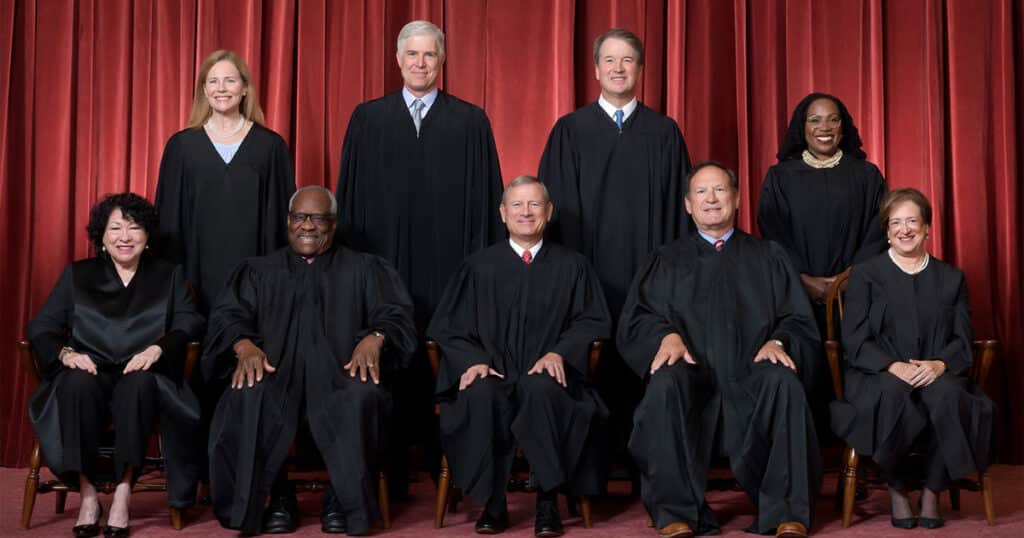
5 Takeaways From Oral Arguments on Universal Injunctions in Birthright Citizenship Case at the Supreme Court
The Supreme Court heard oral arguments Thursday on whether nationwide injunctions violate the Constitution, after lower courts have issued 40 nationwide injunctions against the second Trump administration.
“Universal injunctions exceed the judicial power granted in Article III which exist only to address the injury to the complaining party,” Solicitor General D. John Sauer argued.
The case, Trump v. CASA, concerns nationwide injunctions that lower court judges have ordered, pausing President Donald Trump’s order interpreting the 14th Amendment as not guaranteeing what is known as “birthright citizenship,” the idea that if someone is born in the U.S. to alien parents (who are not foreign diplomats or enemies in a hostile occupation), they are immediately a citizen.
Critics of birthright citizenship note that the 14th Amendment states, “All persons born or naturalized in the United States, and subject to the jurisdiction thereof, are citizens of the United States and of the State wherein they reside,” Emphasis added. “Subject to the jurisdiction thereof” did not apply to aliens who enter the U.S. and then give birth in America, they say, because non-Americans are subject to the jurisdiction of their home countries.
Supporters of birthright citizenship note that the U.S. has extended citizenship to children of aliens born in the U.S. for more than 100 years.
The Supreme Court arguments did not focus on the birthright citizenship issue, but rather the legality of lower courts issuing injunctions that apply to the entire country. Many of the groups filing the lawsuits that result in the injunctions had a great deal of influence in the Biden administration, as noted in my book, “The Woketopus: The Dark Money Cabal Manipulating the Federal Government.”
New Jersey Solicitor General Jeremy Feigenbaum argued in favor of the legality of universal injunctions, claiming that an injunction that only applied to New Jersey would not address the issues in the case.
Kelsi Corkran, Supreme Court Director at the Institute for Constitutional Advocacy and Protection at Georgetown University, represented immigration groups.
Sauer’s Argument Against Universal Injunctions
While judges have the authority to issue temporary injunctions to protect one of the parties in a case from harm while the court considers the case, the Trump administration claims the judges have abused this power, claiming to protect people across the country who aren’t parties to the suit.
Sauer noted that courts have issued 40 universal injunctions against the federal government, including 35 from the same five judicial districts.
He argued that these injunctions “prevent the percolation of novel and difficult legal questions” through the normal legal process. He also argued that “they encourage forum shopping,” that is, parties filing lawsuits in certain areas, seeking friendly judges who will issue injunctions on their behalf. He further argued that they circumvent Rule 23, the process by which plaintiffs apply for class action.
“They create what [Supreme Court] Justice [William] Powell describes as repeated and essentially head-on confrontations between the life-tenured and representative branches of government,” Sauer added, referring to a justice who served from 1972 to 1987.
The History of Universal Injunctions
Justice Clarence Thomas asked Sauer about the history of universal injunctions, and the solicitor general pointed to 1963 as the first example.
“We survived until the 1960s without universal injunctions?” Thomas asked.
“Correct,” Sauer responded. “Those were rare in the 1960s. It exploded in 2007. The Ninth Circuit started doing this with a bunch of cases involving environmental claims.”
The solicitor general noted that “the court consistently said you have to limit the remedy to the plaintiffs appearing in your court.”
In response to questions from Justice Brett Kavanaugh, Sauer brought up the history of President Franklin Delano Roosevelt’s New Deal, where “there were passionate challenges to nationwide policies,” but when judges held New Deal policies illegal, they issued “hundreds of injunctions protecting individual plaintiffs.”
New Jersey Solicitor General Jeremy Feigenbaum cited the English common law practice of a “bill of peace,” which judges used to settle multiple related claims against a defendant in a single lawsuit. The practice allowed the court to bind all members of a “multitude” with the outcome, even if they didn’t directly participate in the lawsuit. Sauer argued that a “bill of peace” most resembles class-action lawsuits, not universal injunctions.
Feigenbaum also cited cases from before the 1960s, which Sauer claimed do not represent universal injunctions.
Corkran argued that if the court ruled in Trump’s favor, it would reject “the status quo all three branches of government have ratified and operated under for over a century,” warning that “catastrophic consequences would result for the plaintiffs and our country” if the government can “execute an unconstitutional citizenship-stripping scheme simply because the court challenges take time.”
Alternatives to Universal Injunctions
Sauer argued that judges have alternatives to universal injunctions, such as class-action lawsuits.
Feigenbaum noted many practical considerations that would make unworkable an injunction that only applied to New Jersey.
He noted that if children of illegal aliens don’t have U.S. citizenship in other states but do gain it when they move to New Jersey, that introduces serious problems with New Jersey’s legal obligations to provide benefits, such as Medicaid, to citizens.
“They did not get Social Security numbers because they would not have been eligible for the enumeration at birth,” Feigenbaum said. “They are going to arrive and seek benefits that we administer. Federal law requires that they have Social Security numbers for the administration of these benefits.”
Elena Kagan Taunts Sauer
Justice Elena Kagan taunted Sauer, noting that many judges have ruled against the Trump administration.
“This is not a hypothetical. This is happening. Every court ruled against you,” she said.
Sauer argued, however, that nationwide injunctions encourage “forum shopping,” so the success of nationwide injunctions in courts that plaintiffs target because judges are more likely to side with them may illustrate bias, as well as legal concerns.
Good for the System?
Justice Ketanji Brown Jackson, President Joe Biden’s appointee, suggested that universal injunctions might be healthy for the judicial system.
“It seems to me that when the government is completely enjoined from doing the thing it wants to do, it moves quickly to appeal that,” bringing the case to the Supreme Court.
Sauer responded that the courts are supposed to work more slowly, methodically considering cases and not rushing them through emergency dockets to the Supreme Court. The “percolation” of cases through lower courts up to the Supreme Court is “a merit of our system, not a bad feature of our system,” he responded.



